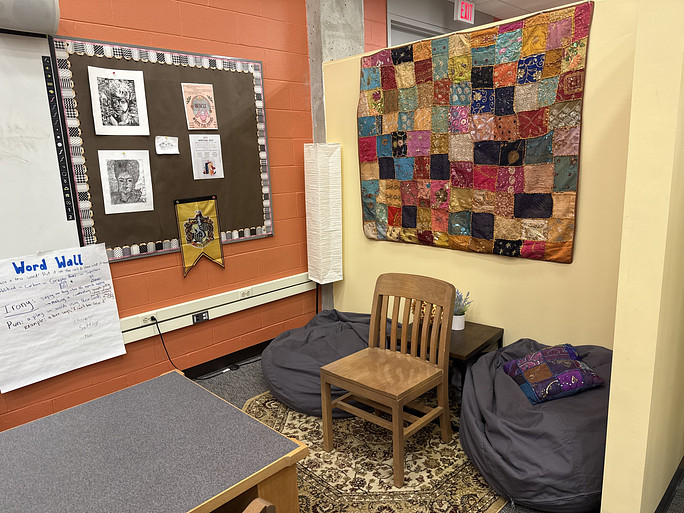
- Above: Students with the words “Failure Due To Attendance” across their foreheads. From left to right: Blue and Gold Staff Members Andrew Cogliano, sophomore, and Grace Stathos, junior; sophomore Ricky Cordero; Blue and Gold Staff Member Nicholas Bramante, sophomore. Photo by Jessica DePaula. Background photo of prison bars by user Andrew Bardwell on Wikimedia
“Attendance is key,” as it is stressed by countless school officials and teachers. Of course this is true—missing class is undoubtedly detrimental to one’s high school education, which is full of lessons, exams and work to complete. But what is to be said about those who are, in any case, unable to be at school?
The school has responded to this with a multifaceted policy that may have contributed a better attendance record over the years—but is it truly as “fair” as it is portrayed?
There are many issues to deal with when it comes to attendance, especially since it is not the tardy and the truant, but the exceptions, that are the key focus of discrimination. How do we avoid punishing those who are sick, physically or mentally, to a far extent? Should we be treating exceptions on a case-by-case basis, or should we have specific situations written in text? Reporters of the Blue & Gold investigated this issue to tackle the core flaws of the system.
A STUDENT’S VIEW by GRACE STATHOS
Imagine this: it is 6:30 a.m. on a school morning, you barely got any sleep last night, your unfinished trigonometry homework is still scattered across your lap from when you fell asleep mid-problem, and you’re too stressed about your Spanish presentation to even eat breakfast. You don’t want to go to school, but you have to.
For many students, their anxieties are not limited to school, and some days, being able to put on a brave face and dealing with it is not an option. Many Malden High School students, who were anonymously interviewed for this article, stated that their anxiety often interferes with their attendance, and on these days, they often need to stay home from school. Due to our school’s attendance policy, days like these can only come four times a quarter.
“[I am] scared to miss school because I [do not] want to fail, but [I am] scared to go to school on a day that my anxiety is bad, so I just have to pick which one I would rather deal with,” an anonymous MHS junior admits.
Answers like this were very common among the MHS students. More often than not, students stated that they would rather miss school than have to come on a day where they are experiencing high anxiety.
Mental Health & Students in North American High Schools
25.1% of high school students in the United States suffer from an anxiety-related disorder (Anxiety and Depression Association of America)
The Public Citizens for Children and Youth found in an August 2013 study that Philadelphia children and teens were forced to wait 15 days for an initial appointment for behavioral health, and then 12 more days before receiving any actual treatment.
A May 2011 Canadian study on the effects of excessive wait periods for access to adolescent mental health care stated: “At an individual level, long wait times may result in prolongation of physical and emotional distress and social dysfunction at home, at school, and in the community.”
WHAT IS OUR ATTENDANCE POLICY?
After grades have been posted to X2, all MHS teachers are required to give any student with more than four absences “No Credit Due to Attendance.” Without a doctor’s note, these absences are seldom excused, and they must attend a meeting for the appeals board. This system, which began as an experiment carried out in October 2012 after first quarter grades closed, has students explain their absences to a group of administrators, teachers, and a student representative who will decide whether or not the absences can be overlooked. If they do, you receive the grade you earned; otherwise, your score will be curved down from a 59. House principals have said that you may only get one appeal per year–however, it appears that this is decided on a case-by-case basis.
On the surface, it makes sense; if you really cared about school, you wouldn’t have those unexcused absences. The automatic fail should be motivation to get students to come to school on those mornings when they would rather be doing anything other than walking through those front doors. But what if a student does make up the work he or she missed and attempts to catch up? Is giving them a 59 accomplishing anything other than enforcing a failing grade?
ACCOMMODATION OR VIOLATION? by JESSICA LYNN DEPAULA
“To play devil’s advocate, an argument could probably be made that an attendance policy is not necessary, because the student will fail their classes regardless of attendance… natural consequences will occur if you are chronically absent. If you do well, even if you are out, you are demonstrating that you know the material. I can see both sides of it, and wanting them to stick things through even if they are unpleasant and uncomfortable, but it doesn’t need to be addressed by a reduction in grades.” – An anonymous Staff Member
I had four absences first quarter and, having been made well-aware of the three-absences-per-marking term rule throughout my time as a Malden High School student, immediately scheduled an appeals meeting. Having this impending meeting looming over my head was something which caused me extreme amounts of stress, worry and anxiety over a period of about a week, and while I was relieved to be informed, the day of the meeting, that the appeal wouldn’t be necessary, I found myself questioning the way that attendance is dealt with at this school.
But my biggest problem with the policy–and, as it turns out, many other students’, as well–is the fact that our grades and successes at MHS, which do not, necessarily, directly correlate with attendance, are taken from us and held over our head.
The needs of many students, frankly, aren’t considered with this policy in play, mainly those of us who suffer from mental illnesses. There is no going to your psychologist when you’re having a bad day the way one could walk into their doctor’s office with a sore throat and a fever; try scheduling an appointment for less a month from now.
When making initial arrangements for my behavioral health evaluation, I was given a date six weeks into the future; thousands of other patients have found themselves in similar situations.
The concept of dealing with absences on a case-by-case basis sounds like a fair plan, but there are several issues regarding it that overrule its even-handedness. Without a code, or written guideline for how to deal with particular reasons for absences, it is left completely in the hands of the participants of the Appeals Board. Though there is diversity in character used in the process, it can only take one bad impression or shared fallacy that costs a student their grade and, possibly, their future goals. This is especially true for students with mental health issues, who are often viewed as “pathetic” and “lazy” by unaware or uninformed members of society.
I am all for teaching the importance of attendance; it’s crucial to survival in life. There are going to be days when you need to go to school, or work, even though you’re exhausted or sick or just don’t feel like it. But what happened to teaching us compassion? There is more to life than knowing how to show up someplace; are we as a society just expected to accept that the world is a cruel place where nobody – teachers, employers, friends, family – ever cares if you’re chronically ill, chronically miserable, chronically unlucky?
Of course we shouldn’t miss over four days per marking term. In a perfect, utopian Malden High School, nobody would ever get sick, or miss the bus to school, or be too poor to even go to the doctor, or suffer from anxiety and depression so severely they can’t drag themselves out of bed in the morning. The fact of the matter is, if you truly care about your grades and you miss school, be it for four days or 14, you will most likely have a very good reason for it.
Unfortunately, the city of Malden is not perfect, and Malden High School is no utopia.
HOW CAN WE FIX IT?
Here are some ideas that may draw to a more healthy, cohesive plan for attendance:
- While attendance understandably affects grades like participation and classwork, it should not be discrediting quizzes, tests, essays, and homework, unless those are visibly abandoned.
- Be more flexible with the number of sick days and invest in an official, effective policy for makeup work.
- Establish a written protocol that, instead of judging circumstances, examines them – punitive measures have a different connotation for students that skip than to students who are facing serious mental or psychological setbacks like anxiety or depression, or, in other cases, physical illness. There needs to be continuity in how each issue is treated.
What did you think of this article? Comment below for discussion, or send us a letter-to-the-editor!





